https://www.college-aromatherapie.com/formations-de-base/voyage-olfactif-2019
« …Sometimes we find an old bottle that remembers, From which springs a whole lively soul that returns. ».
Charles Baudelaire, The Flowers of Evil
In our time, the world is increasingly complex, difficult, and constantly changing. Everything is moving faster and faster, society imposes an accelerated pace on us, the individual is relegated to the background in favor of the cult of performance, competitiveness and perfection. All these transformations at the level of norms and values place the person in a dynamic of result or struggle to exist generating: stress, anguish, anxiety and discomfort. We are unfortunately in a generation of "burn out", studies show an overconsumption of anxiolytics and sleeping pills of all kinds (in France and Belgium this concerns ¼ of the population). Yet, at the same time and paradoxically, we have never talked so much about “well-being, nature, resourcing”, … and fortunately…
A therapeutic journey is possible thanks to essential oils to allow us to harmonize between ourselves, to discover the resonances and meanings of certain tumults in our journey, (re) to find our singularity as best as possible for us.
In this article we will therefore try to understand how it works in practice and why odors are so important in the psycho-emotional and sensory sphere such as, for example, when dealing with stress management, sleep disorders, chronic behaviors, mourning. , etc. Why are essential oils so effective at this level and how can they really help us?
« An hour is not just an hour, it is a vase filled with perfumes, sounds, projects and climates ».
Marcel Proust
What if our emotions and behaviors were influenced by the smells we breathe? ?
The sense of smell develops during pregnancy. From birth, it allows the baby to recognize his mother, it is thanks to his little nose that the infant develops his first emotional bonds.
In everyday life, smell makes us aware of possible dangers in the event of fire, gas leak, etc. We can recognize up to 10,000 smells! Smell is the only one of the 5 senses to be directly connected to the brain.
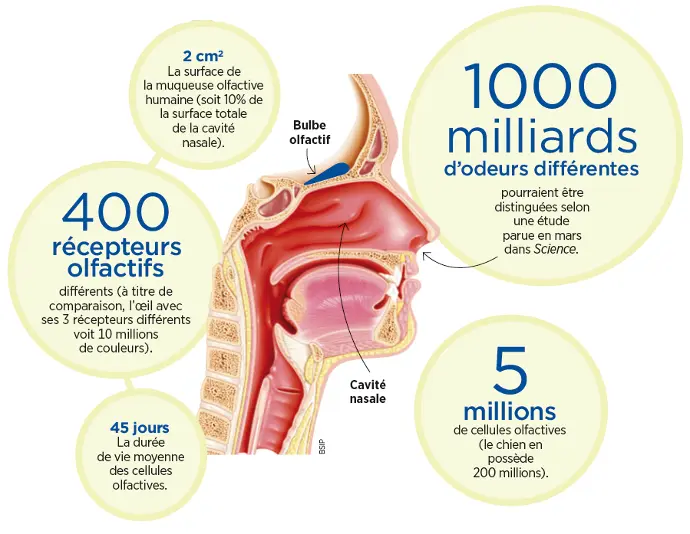
https://sylviehurel.fr/mise-en-place-dun-atelier-olfacto/
How it works ?
Everything that smells, “odors” constantly emit very light substances, these are molecules, assemblies of elements which form species of clouds. When one of these clouds passes under our nose, we perceive an odor (which is different depending on the molecules that constitute it).
By what mechanism do we manage to perceive all these odors? ?
When we breathe all the substances contained in the air enter into channels inside the nose. Then, it arrives in a small area, the olfactory mucosa which contains 10,000,000 special cells, this area is iridescent with eyelashes. At this level, the molecules will attach to receptors, which will be housed in cavities (olfactory bulb) located at the end of the eyelashes. A cavity corresponds to a type of molecule, there are fewer cavities than molecules, fewer receptors, so certain nuances escape us.
Then, when the molecule touches the receptor an impulse is transmitted to the brain (limbic system) via nerve fibers then with this odor the brain will associate an image that it stores.
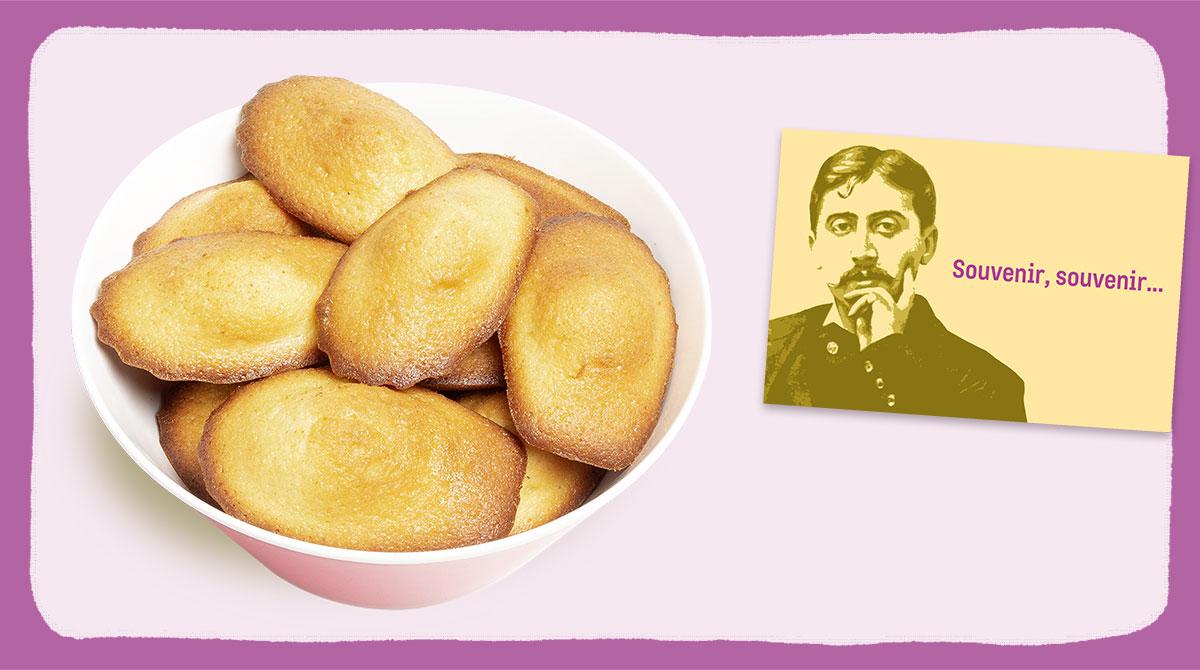 https://www.jebouquine.com/activites-et-tutos/recette-de-madeleines-pour-un-gouter-litteraire
https://www.jebouquine.com/activites-et-tutos/recette-de-madeleines-pour-un-gouter-litteraire
We've all smelled a smell that immediately reminds us of a past memory. For example, a smell that reminds us of our grandmother's delicious meals and makes us think directly of her or, on the contrary, a smell that reminds us of a very unpleasant event, Brussels sprouts!
Marcel Proust is very often cited in scientific studies when discussing the relationship between smells and emotions. In his book “Du Côté de Chez Swann”, the author mentions that when he ate a madeleine dipped in tea, he plunged, despite himself, into a forgotten childhood memory which came back to him at that moment - there in memory.
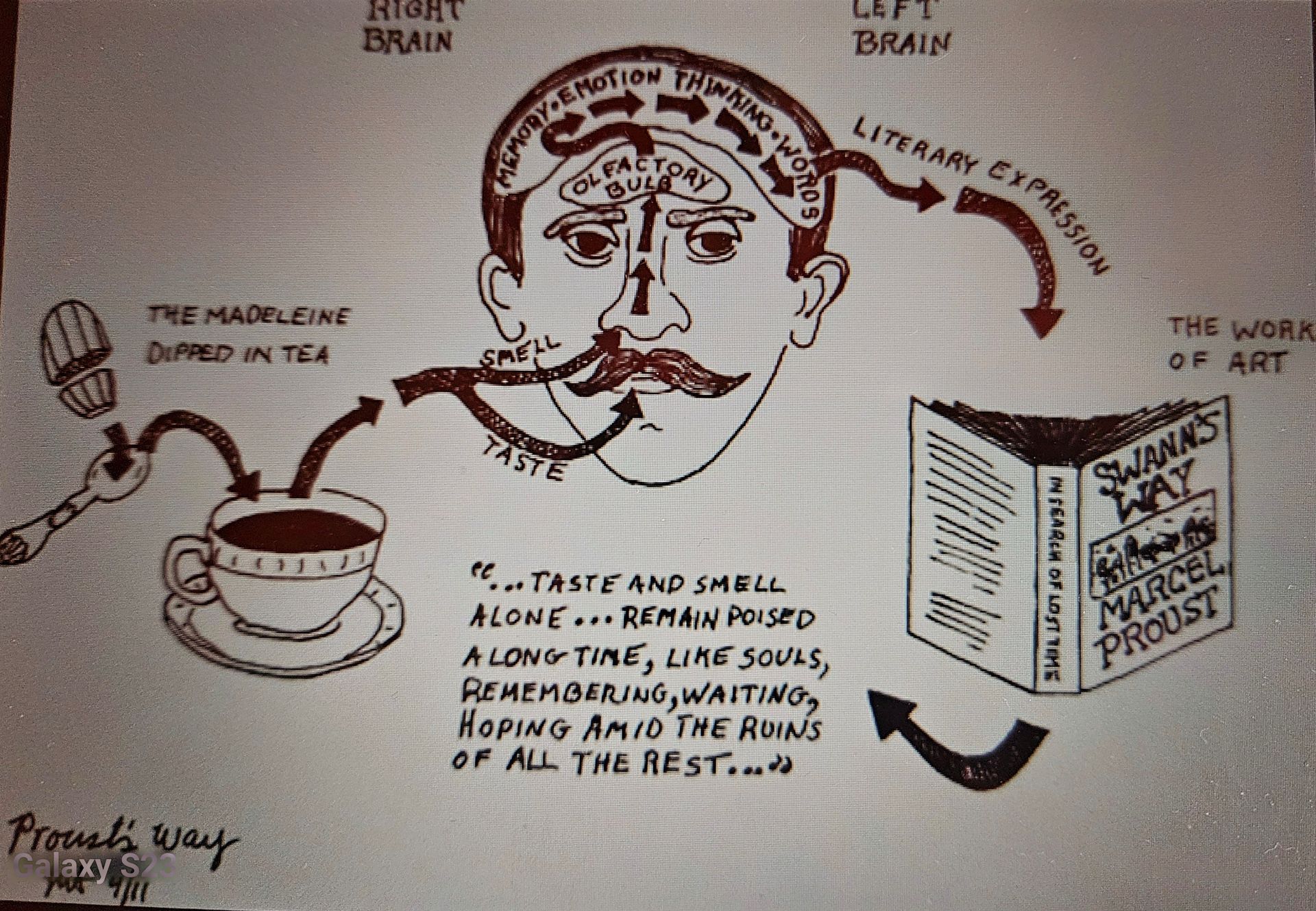 https://blog.culturaldetective.com/2014/09/02/cultural-madeleines/
https://blog.culturaldetective.com/2014/09/02/cultural-madeleines/
📌 Episodic memory : the brain is capable of storing detailed memories of events experienced. This is episodic memory. These memories are associated with sensory information such as smells, tastes, sounds and images.
📌 Emotional triggers : Memories related to strong emotions tend to be better stored and more easily recalled. Because taste and smell can evoke intense nostalgic emotions associated with memories because they were initially created together.
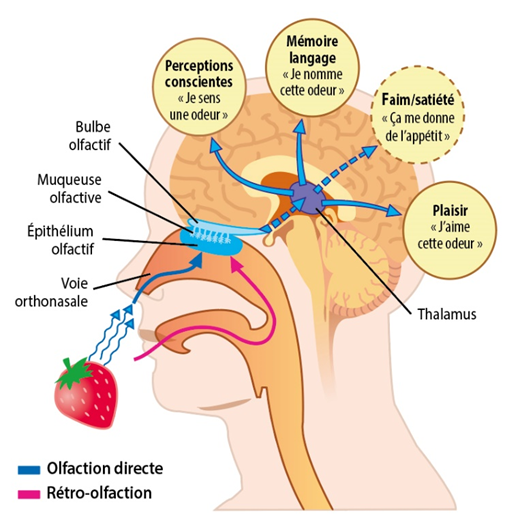
https://cursus.univ-rennes2.fr/mod/folder/view.php?id=515567
To summarize, when you eat a dish from your childhood or smell a familiar scent, neural connections associated with stored childhood memories are activated in the brain. Which thus triggers the return of nostalgic moments. When they are also linked to strong emotions, they have an even greater tendency to come back to the present.
What is important to remember is that the sense of smell is directly connected to the limbic system, a structure which receives information from several places in the brain. It plays a very important role in our emotions, memory and our behaviors.
Emotions and memory are linked because our brain is designed to memorize everything associated with a strong emotion.
For example, even if we were not busy doing some particular or significant things during the attacks in Paris or Brussels or even when the confinement was announced during the health crisis linked to Covid – 19, it is very likely that we remember exactly what we were doing when we heard this news.
This ability is very important for human beings because if we find ourselves in a dangerous situation, which causes significant anxiety or strong emotion, our brain will record everything to prevent us from finding ourselves in the same situation.
So, if one day we are faced with a similar event, red lights will light up. Memory and emotions are intrinsically linked.
Odors therefore influence our behavior. In the street, we would be more easily approached by a person who smells good than by someone dirty who smells bad. The same in a store, if it diffuses perfume, we would tend to wander around, taking our time. Moreover, this is not trivial, it is in reality a marketing approach which aims to influence our behavior to encourage purchasing. (Bakery, perfumery, etc.).
Regarding aromatherapy, we will focus on how essential oils can help us with psycho-emotional difficulties.
It is important to point out that at the olfactory level, there is no ready-made recipe that suits everyone. Even if essential oils have specific properties depending on the plant from which they come, the aromatic molecules they contain do not necessarily provide the same effect in the emotional sphere. Indeed, each person is unique and the perception of odors is specific to the person according to their experience, their reality and their feelings of the present moment.
When we are in a low mood, a smell that is usually pleasant to us can seem unpleasant to us.
There is therefore no standardized response to a psycho-emotional problem. To answer this, it is essential to be able to construct with it a smell that pleases it according to its history and the state in which it finds itself here and now.
As part of an olfactory consultation, the objective is to be able to carry out an anamnesis, not only to ensure that there is no contraindication to using this or that essential oil, but also to determine your temperament (in a future article, we will discuss the importance of temperament when it comes to the use of essential oils). Then, depending on the difficulty and the desired goal (insomnia, blockages, discomfort, etc.), the idea is to first select essential oils generic to this type of problem and to develop an aromatic substance based on what resonates positively with the person.
So, even if certain smells are appreciated by many people, we should not generalize. So, for example, lavender can evoke pleasant sensations in some people: vacation, Provençal sun, relaxation, etc.) and in others, the unpleasant memory of a fierce grandmother who placed small sachets of lavender to perfume the wardrobes.
During workshop facilitation, this observation also occurs. However, when the person constructs their own smell, the relationship with this smell changes and their behavior changes positively. And it is this relationship with smell that will be worked on in order to provide support in the face of a difficulty encountered.
Smell therefore has a significant first impact on the central nervous system via the perception of odors by the olfactory system but also has a second impact via the blood circulation, the capillaries of the nasal septum.
In the context of stress management, the choice of synergy will be oriented towards an essential oil which triggers a reminiscence mechanism (return to the mind of a memory not identified as such) or having a positive emotional reaction which will allow the person to reduce tension and pressure. In addition, we will take care to choose as a complement, an essential oil whose molecules have an influence on the nervous system and which pass through the blood circulation. For example, clemandine petitgrain which will act as a natural anxiolytic thanks to ester molecules, mainly methyl anthranilate with relaxing properties and the presence of monoterpene molecules for its regulatory effect acting on the nervous system.
The olfactory route is therefore the essential royal route in aromatherapy when the targeted objective falls within the psycho-emotional sphere because it acts on the sympathetic and parasympathetic nervous system.
The advantage of the olfactory route is that there are few contraindications. In addition, it is a fairly simple method of use which can be practiced in all circumstances using an inhaler stick, in particular, in a relatively discreet way, which can be carried anywhere: in one's pocket, in his pencil case, in his bag, etc.
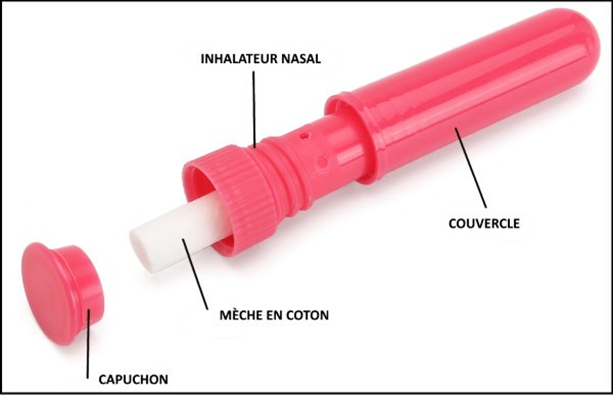
The olfactory route via an inhaler stick is not the only method of use in emotional therapy. Indeed, there are several possibilities: the roll on, the room spray, the diffusers, etc.), so sophrology, meditation, the use of essential oils in diffusion are also very enriching holistic approaches. Without forgetting massages or palmar and plantar reflexology with essential and vegetable oils via the skin.
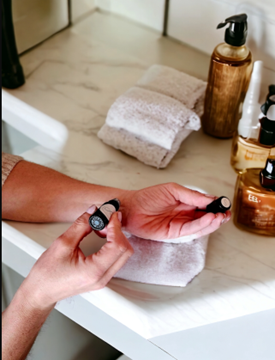
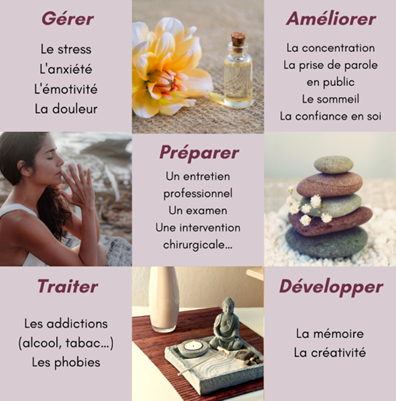 https://sophropsychoenergetique.com/la-sophrologie/
https://sophropsychoenergetique.com/la-sophrologie/
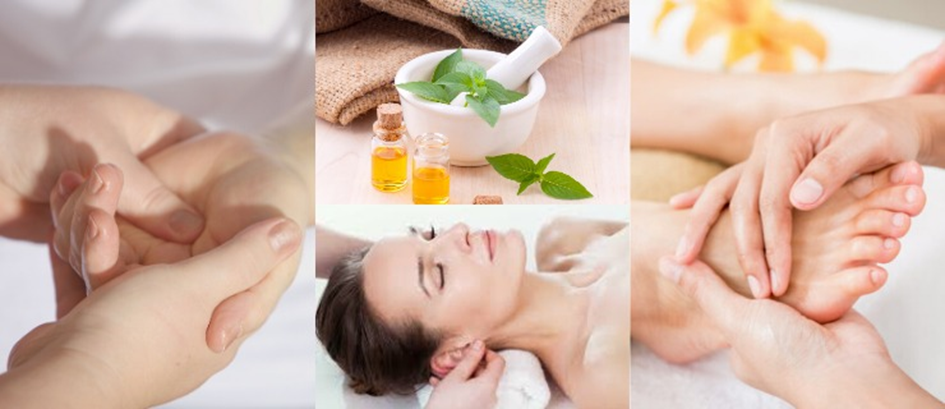 https://www.theraneo.com/siejak-contacts.html
https://www.theraneo.com/siejak-contacts.html
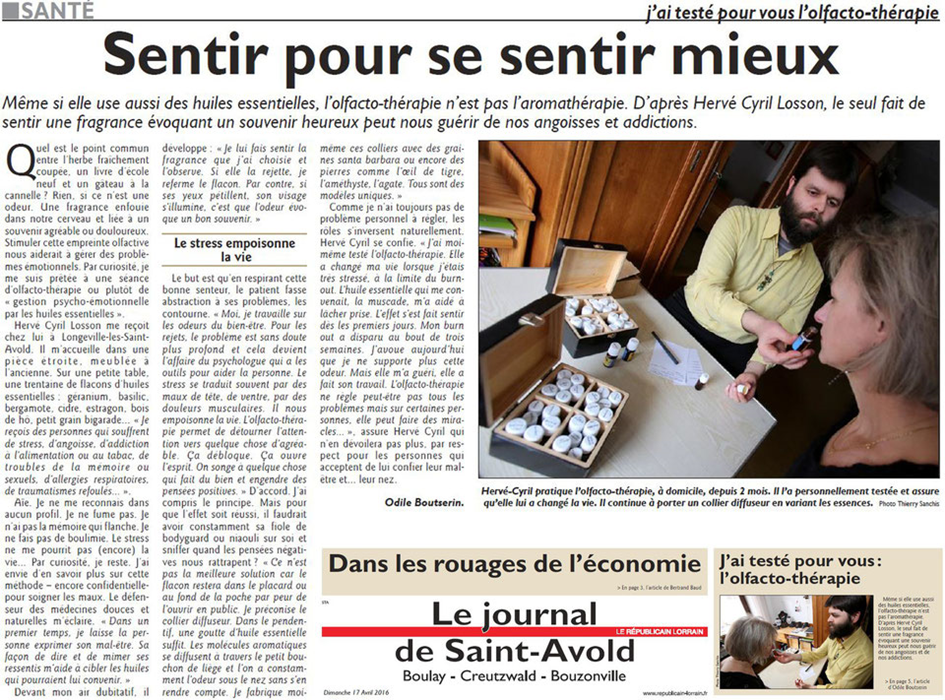 Article paru
dans le journal Républicain Lorrain, dimanche 17 avril 2016.
Article paru
dans le journal Républicain Lorrain, dimanche 17 avril 2016.
Did you like the information in this article? Want to know more? Want to discover the aromatic world to (re)center yourself, take a break or overcome a difficulty? For support for an aromatic treatment, do not hesitate to contact us and/or ask your questions: +32 470 33 53 63 or lateliermarcati@outlook.com
See you soon for a new reading,
Bibliography:
FAUCON, M. (2023), “Sensory approaches in aromatherapy: Use of psycho-emotional essential oils in care”, Ed Dunod
GEA, A. (2022), “Physiology and essential oils, How do essential oils act on the different systems of the body?”, Ed. Dunod
JAFFRELO, A-L. (2021), "Essential oils to smell and feel", Ed. Alternatives
MAILHEBIAU, P. (2011), “The New Aromatherapy:- Essences & Sens”, Ed.Eugenia
*The information written in this article by Atelier MARCATI comes in particular from references from scientific literature and from experience acquired over years in holistic and therapeutic care: aromatherapy, sophrology, lithotherapy, educational sciences, ...in training and/or certification courses. They are transmitted and shared for indicative and informative purposes. They therefore do not claim to replace medical advice, a diagnosis or any treatment.
Découvrez l'intégralité de notre sélection d'huiles essentielles




Essential oils: “The power of smells on our emotions and our behaviors” - Aromatherapy, Olfactotherapy, Aromachology: :